The discovery of the abuses suffered by more than a hundred peasants in the Furakawa Plantaciones CA Ecuador farms
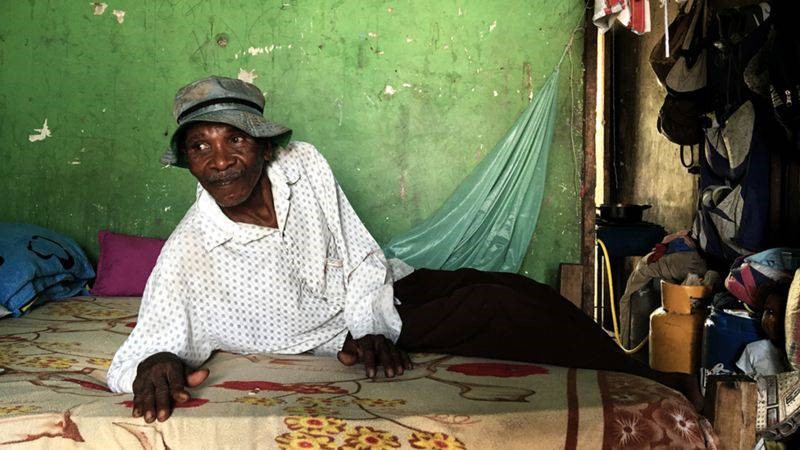
Among the enslaved people were children and adults. Photo: Walker Viazcarra
“Subhuman” working conditions, without drinking water, electricity and sanitation. Working hours of more than 10 hours without contracts or social security. Overcrowding, Child labor, Mutilations due to the unsafe use of agricultural machinery.
These are just some of the abuses suffered by more than a hundred peasants, most of them Afro-descendants, on the estates of Furukawa Plantaciones CA del Ecuador, the main producer of abaca fiber (also known as Manila hemp) in the country.
In a historic decision, on April 19th, a constitutional judge sentenced the Japanese-owned abacalera (fiber company) to compensate 123 of its former employees, who sued the company for the terrible conditions in which they worked and lived.
The magistrate who imposed the sentence, Carlos Vera Cedeño, had already verified last January that in the agricultural fields of Furukawa Plantaciones a modern form of slavery known legally as “serfdom of the gleba” (when a person is obliged by law, by custom or by an agreement to live and work on land that belongs to another person and to lend to that person, for remuneration or free of charge, certain services, without freedom to change their status) was carried out.
His ruling not only marked a milestone for being the first time that a company has been convicted of slave labor in Ecuador, it also set a precedent by holding the state accountable for failing to act to prevent abuses.
“The main responsibility for the violation of the rights of the victims is attributed to Furukawa for all the actions it commits,” says the 246-page sentence.
“However, the Ministry of Labor should be pointed out as responsible for all the violations described,” he added.
“If the Ministry of Labor had complied with its obligation to go to the place where the workers lived, all these violations committed by Furukawa would have been avoided, ” the document highlights.
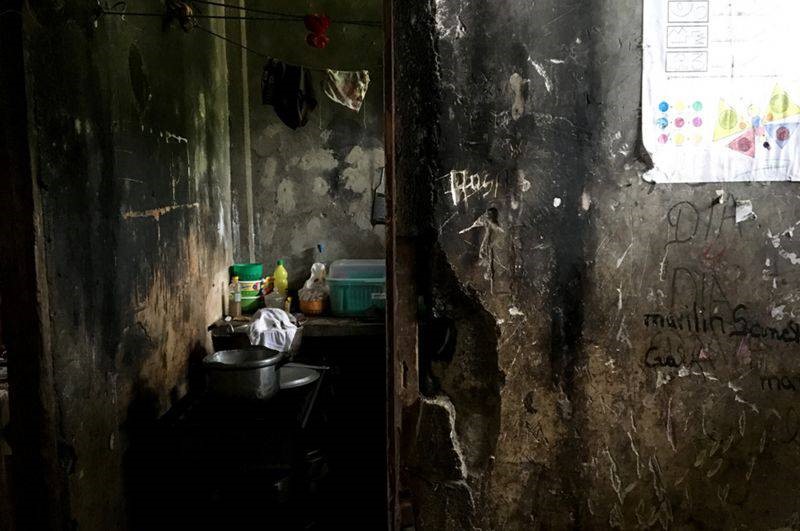
The exploited peasants lived in “subhuman conditions” and most suffer from respiratory problems from the soot from the kerosene lighters they used. Photo: Walker Viazcarra
“For this reason, it [the court] holds the Ministry of Labor responsible for the entire violation of the rights of the victims exposed in this judgment, because the omission of its attributions led to these acts being committed.”
Reparation
Judge Vera Cedeño decided that Furukawa must pay each of the plaintiffs a sum that must be determined by an expert accredited by the National Council of the Judiciary.
In addition, the abacalera, a subsidiary of the Japanese company FPC Marketing Co. Ltd., must give each affected farmer five hectares of land or its equivalent in money.
But the reparation goes beyond money.
The magistrate also ordered the company to publicly apologize to its former employees, through a publication in the most widely circulated newspapers in the country.
The Ecuadorian government must also ask for forgiveness.
The ruling orders the Ministries of Labor, Economic and Social Inclusion and Public Health to issue public apologies on their web pages for not having acted in a timely manner to stop the violations.
The Minister of Labor, Andrés Isch, told BBC Mundo that ” the sentence will be complied with in its entirety.”
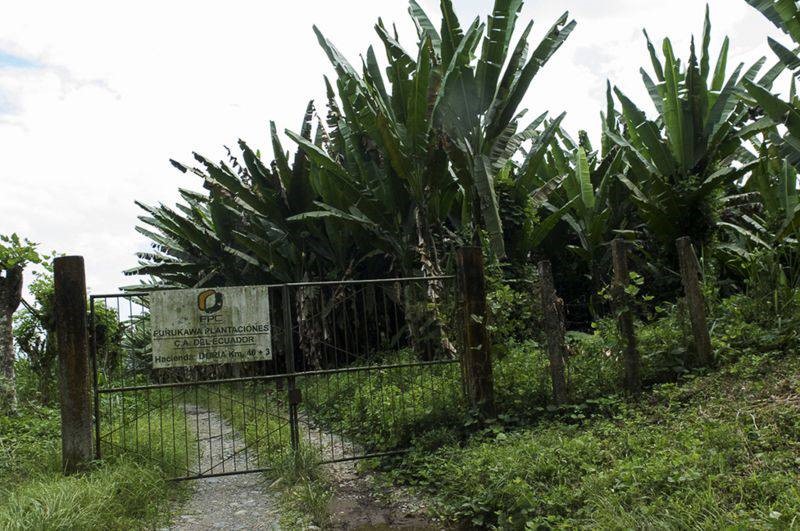
Furukawa has 23 farms spread over an area of 2,300 hectares in northwestern Ecuador. Photo: Walker Vizcarra
The company’s lawyers announced to the judge that they will appeal the sentence.
Award for labor
Two days after the ruling was known, the Ministry of Labor announced that it would withdraw from the Furukawa company a recognition of labor merit that it had received from the Ecuadorian government in 2005, during the Alfredo Palacio administration.
“We have withdrawn, on our own initiative, a decoration given to Furukawa several years ago from the Ministry of Labor,” Isch confirmed.
When asked how a company that exploited its workers has received an award for labor merit from the Ecuadorian State, Isch, who took office in 2020, said he holds previous governments responsible, in particular former Labor Minister Galo Chiriboga who issued the recognition.
“The only explanation I can assume (obviously I do not know the reasons) is that they limited themselves to analyzing the export volume of the company and never made an exhaustive inspection or review of it,” he said.
“Without a doubt, the State failed for decades to identify the abuses and adequately protect those who were in a vulnerable situation (the sentence very clearly identifies such abuses).”
“This case cannot be repeated,” he added.
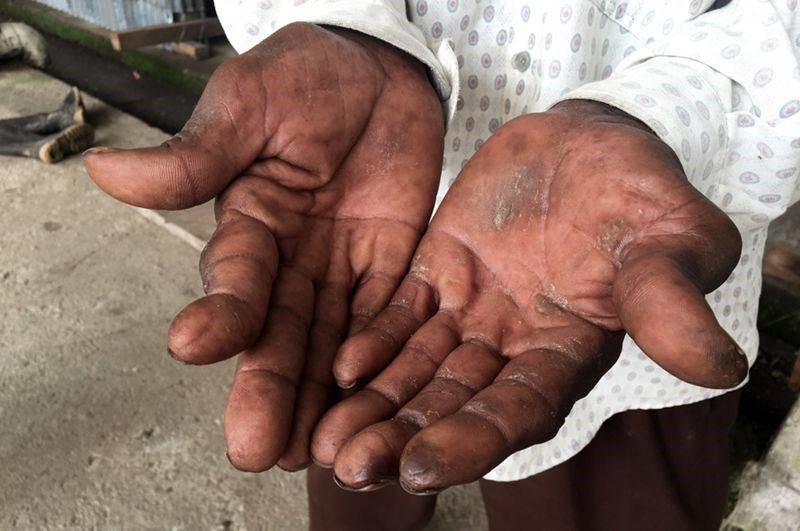
Many of the Furukawa abacaleros have deformed hands from working without protective elements. Photo: Walker Vizcarra
However, human rights activists who joined to form the Furukawa Solidarity Committee, said that the award reveals a collusion between the State and the agro-export sector, which is still in force.
“There is an interest of the State in promoting companies that provide large amounts of income”, said Patricia Carrión, a lawyer of the Ecumenical Commission of Human Rights and one of the sponsors of the ex-workers of Furukawa.
According to Carrión, this leads the authorities to protect —”either by action or omission” —large agro-export companies such as Furukawa.
“Either the authorities have no idea what is happening in these industries, or they are hiding the situations of the workers that live there,” she says.
The lawyer says that even today the “economic and political interests” of the government and this sector continue to converge.
“The current Furukawa Production Manager was Vice Minister of Agriculture during Lenín Moreno’s current government,” she points out.
Furukawa has been in Ecuador since 1963
Furukawa Plantaciones has been operating for almost six decades in Ecuador, a country that is the world’s second largest producer of abaca fiber, a highly resistant material that is used in various industries, including automotive, where it sometimes replaces fiberglass.
The country exports some 7,000 tons of abaca fiber each year to the United States, Europe and Asia, generating more than $17 million.
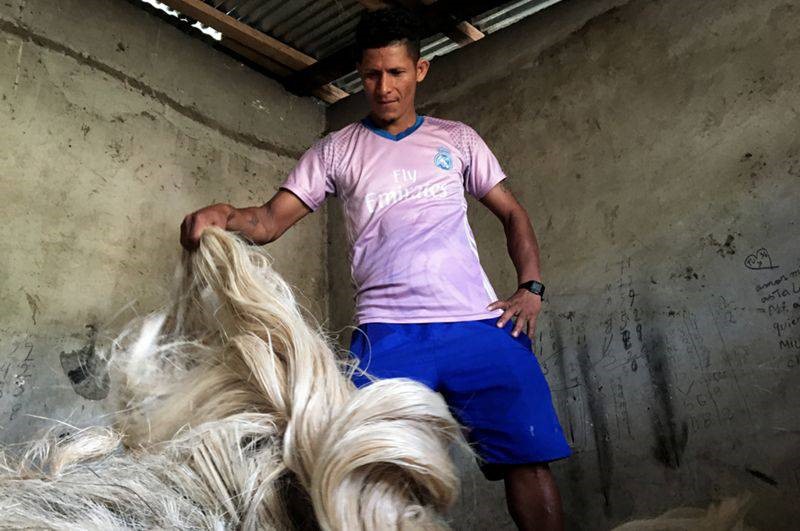
Ecuador is the second world producer of abaca fiber, after the Philippines. Photo: Walker Vizcarra
Ecuador’s main abacalera has 23 farms spread over an area of 2,300 hectares, in the provinces of Santo Domingo de los Tsáchilas, Los Ríos and Esmeraldas, in northwestern Ecuador.
The 123 former workers who brought the case against the company lived together with their families in hazardous homes built on several of the estates, most of which have now been torn down.
Walker Vizcarra, a photographer and anti-violence activist, photographed some of these places in 2019, and said that they were small buildings of about 10 to 15 square meters, where families of 3 or 4 people lived, on average.
“There was a single latrine for 17 houses, which was about 20 meters from the houses,” he said.
Vizcarra also observed that many of the people had mutilated hands.
“The deformities in the fingers are due to the fact that when the fibers pass through the machine that frays them, many times by force, it comes loose and hits the fingers of the hands, sometimes it cuts the fingers or breaks them,” he explained.
Poor and sick
An expert medical report carried out by the Ministry of Health at the request of the defense determined that, in addition to limb injuries, all the plaintiffs suffered from a chronic disease .
Some had skin infections, but most suffered from respiratory diseases as a result of breathing in the dust that is produced when processing abaca, but, above all, from the residues of kerosene lamps used to work at night.
Even children suffered from these diseases. According to Carrión, many were forced to work from the age of 8 or 9.
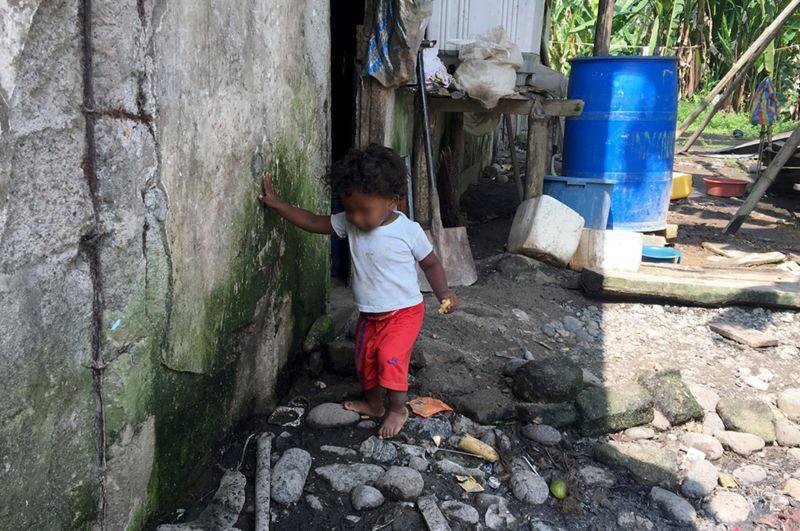
The authorities found that there was child labor on the Furukawa farms. Photo: Walker Vizcarra
A registry on the living conditions of 400 abacalero peasants carried out in 2019 by the Ministry of Economic and Social Inclusion showed that 83% lived in conditions of extreme poverty and only 2% were not poor.
Carrión points out that it is this poverty that keeps the workers enslaved.
“They live in conditions that do not allow them to go elsewhere to look for work,” she says, listing, among other obstacles, the lack of means to move from farms that are far from the main roads.
It was because of a complaint investigated in 2019 by the then Ombudsman Gina Benavides – the first woman to hold the position – and thanks to a group of volunteer lawyers who came together to defend the exploited workers – including Carrión and the main lawyer, Alejandra Zambrano- that this modern slavery case finally came to light and a conviction was reached.
What happens now?
Despite the historic ruling against Furukawa Plantaciones CA del Ecuador, the truth is that the company has been able to continue operating as always.
Beyond a fine of $42,880 and a closure for 90 days ordered by the Ministry of Labor in early 2019—after the Ombudsman’s Office presented its report on the abuses—the abacalera has not suffered closures or received other sanctions.
In the statement issued by the ministry to announce the closure, in February 2019, it was detailed that the inspections found, among others, “inhumane working conditions, child labor, unhealthy, occupational risk, lack of delivery of clothes and tools of work, work accidents (and) elderly people.”
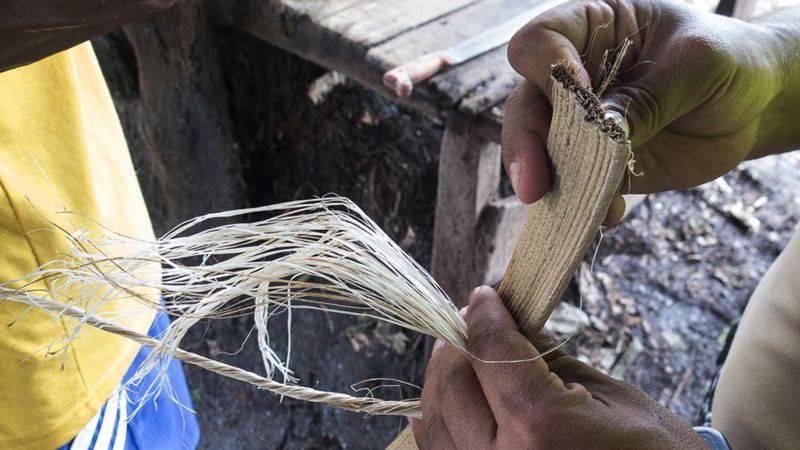
Ecuador’s main abacalera claims to have only two hundred employees, but a state census confirmed that more than 1,200 people lived and worked on the company’s farms. Photo: Walker Vizcarra
Furukawa Plantaciones claims to have 198 direct workers who earn salaries equal to or higher than those established by law and enjoy all legal benefits, including social security, uniforms, gloves and other elements for the performance of their work.
However, a census conducted by the National Secretariat for Policy Management (current Ministry of Government) in March 2019 revealed that 1,244 people lived and worked within the Furukawa estates.
This is detailed in a report published by the International Federation for Human Rights (FIDH), which in July 2019 coordinated a mission that verified “the existence of cases of contemporary forms of modern slavery in Ecuador.”
Most of the people were of African descent, had no formal education and were illiterate.
Fear of complaining
According to Carrión, only 123 dared to denounce their employers, knowing that they would be unemployed.
“Many cannot afford to complain,” she maintains, assuring that slave labor “is the daily routine of Ecuadorian agriculture,” and it also occurs in other profitable industries for the country, such as bananas and shrimp.
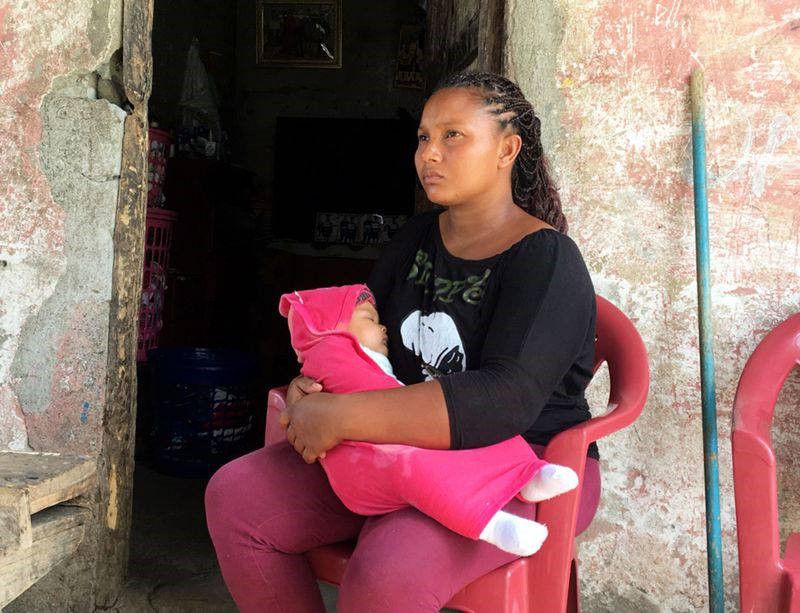
The abuses on the Furukawa estates were brought to justice thanks to the work of a group made up mainly of women. Photo: Walker Vizcarra
” I feel like a human being again, ” Carrión says one of her clients told her after winning the trial.
However, the lawyer warns that the victims will not receive any compensation until the sentence is final, after the appeal is resolved, which has already been presented by the Ministry of Labor.
Asked about this, Minister Isch explained that “there is a rule that obliges public institutions to challenge decisions that are against them.”
However, the official said, “We are not going to wait for the result of the second instance, we are going to comply with the obligations immediately.”
Among these, he said, includes ordering monthly inspections of the Furukawa company.
Isch denied that today there are other cases of modern slavery in Ecuador, as denounced by human rights organizations.
“Inspections are constantly carried out both for complaints and on a random basis. Similar situations have not been identified since I took office,” he said.
He also stressed that “it is urgent to generate more and more confidence in the public, precisely so that if there is any case of abuse, citizens are willing to report it and that it is easier to take corrective and protective actions.”
Carrión points out that, regardless of what the appeals court decides, this unprecedented ruling has already had positive consequences.
“Another 188 workers and former workers from Furukawa have already asked the Ombudsman’s Office to sponsor them to denounce the company,” she says, showing hope that the ruling will encourage other victims of slave labor to seek justice.

0 Comments